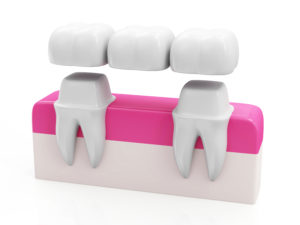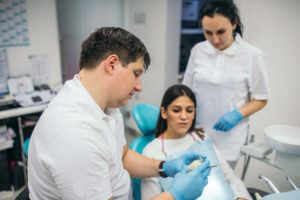Dental Bridges in Mount Pleasant, Michigan

Teeth Replacement available in Mount Pleasant, MI
Dental Bridges Close the Gap in Your SmileDental bridges replace missing teeth and teeth that are too badly damaged for crowns or fillings. They help hold remaining teeth in proper alignment and keep natural teeth from bearing too much stress from biting and chewing. This is one of the most common dental procedures for filling a gap in a patient’s smile. Dental bridges are a commonly recommended treatment for replacing one or more missing teeth with realistic prosthetics. Although adult tooth loss in the U.S. is decreasing overall, a high percentage of people do lose one or more teeth to gum disease, cavities, or fractures at some point. According to the National Institute of Dental and Craniofacial Research, adults lose an average of one-to-two permanent teeth (not counting wisdom teeth) before the age of 50.
Contact Us Today For A Consultation
Why Choose Dental Bridges?Having a gap in your smile can make you feel self-conscious about your appearance. But a missing tooth can do more than just impact your looks. Each tooth in your mouth plays an important role in keeping the rest of your teeth in line. When you lose a tooth, the teeth on either side can begin drifting out of alignment. So, even if you lose a back tooth that no one usually sees, you could end up with crooked front teeth unless you have your smile repaired. This type of restoration allows you to bite and chew normally again (with the exception of very hard foods). It can also help correct speech problems associated with missing teeth.
Candidates for Dental Bridge TreatmentThis treatment is designed for patients who have a badly damaged or missing tooth that can’t be restored with a crown or filling. Candidates with good dental hygiene habits are the best candidates. Poor brushing and flossing habits can lead to premature failure of these dental prosthetics due to gum disease and cavities in surrounding teeth. Bridges can be used to restore one, two or three missing teeth in a row. However, some patients with several missing teeth may be better candidates for a partial denture. Patients with a single missing tooth may opt for a dental implant instead of a bridge in some circumstances.
What is a Traditional Dental Bridge?A traditional bridge requires the presence of a healthy tooth on either side of the gap to support the prosthesis. This bridge consists of three crowns that are all attached to each other. The crown in the middle is actually called a “pontic” and is the prosthetic that replaces the missing tooth. The two on either side are regular crowns that fit over existing teeth called the abutment teeth. Porcelain and porcelain fused to metal (PFM) are the most common materials used for these dental bridges.
Traditional Dental Bridges ProcedureThe placement of a dental bridge is a two-stage process. After a consultation, examination, and x-rays, the two abutment teeth are prepared. This process involves removing enamel from all four sides and the top of each tooth. This reduction creates enough space to place a crown over each abutment tooth. A mold of the treatment area is created and sent to a dental lab for custom-manufacturing of your bridge. You will wear a temporary bridge until this customized prosthetic arrives. The second visit involves an in-depth fitting of your permanent bridge. It is adjusted for maximum comfort and function. You may wear the bridge with a temporary adhesive for a while to make sure it fits just right. Then, it will be cemented in place for good. During your fitting, you will receive detailed instructions for cleaning and flossing around the bridge to make sure bacteria and food don’t build up in any small gaps or crevices. A bridge can last for many years with proper care, keeping your smile even and attractive.
Contact Us Today For A Consultation
Types of Dental BridgesDr. Kenneth Egger performs several other types of dental bridges that may be more suitable for some patients. These include:
Cantilever Dental BridgeThis type of bridge is similar to a traditional bridge. However, it is used when there is no support tooth available on one side of the missing tooth (e.g., with a missing back molar). Instead, two crowns are placed directly next to each other and the pontic is on the end. Some cantilever bridges use only one crown plus the pontic.
Resin Bonded Dental BridgeThis type of bridge uses metal bands and dental bonding resin to attach a pontic to adjacent teeth. The metal bands are positioned on the backside of the support teeth to make them less noticeable. This approach does not require extensive preparation of the adjacent teeth since they do not receive crowns. A resin bonded or “Maryland” bridge is sometimes used for restoring front teeth.
Implant-Supported Dental BridgesPatients with good jaw bone density are often candidates for smile restoration with implant-supported bridges that replace two or more teeth. One or more titanium implants are placed directly in the jawbone where they fuse with the bone during healing. The implants are finished with porcelain crowns for a very natural appearance. This is the sturdiest type of crown since it most closely mimics the performance of a real tooth.
|
Schedule a Consultation Today!
To learn more about our dental services, please call us today to schedule a consultation.



